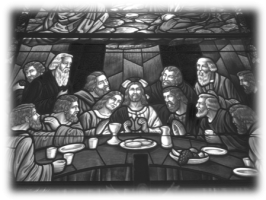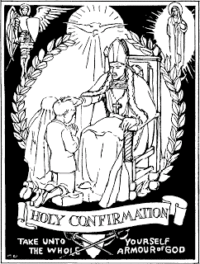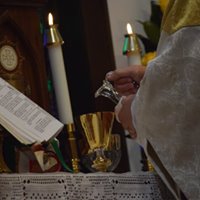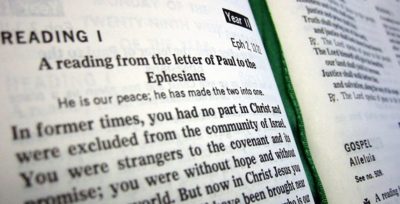On Having Holy Communion Often? Tractate VI

ON HAVING
HOLY COMMUNION OFTEN?
The Rev’d. Stephan W. Heimann
Our Lord Jesus Christ gave us the Sacrament of Holy Communion so that Christians everywhere could always be one with Him and share in His holy life and saving death. For this Sacrament, He made use of a common and necessary human act: the eating of the everyday food of bread and wine. He made sure that His command to “do this in remembrance of Me” could be obeyed often, and Christians, since the night He instituted it, have obeyed it at all times and in all places.
The Acts of the Apostles records that the Christian Church “continued in the Apostles’ teaching and the fellowship, to the breaking of bread and the prayers” (2:42). That book also records that when the disciples came together on the first day of the week, it was to break bread (20:7). The term “breaking bread” is a euphemism for the thanksgiving (Greek: εὐχαριστέω, eucharisteo) Christ commanded His followers to do (cf.Lk.22:19; Act.27:35; 1Cor.11). So, in other words, from the time of the Apostles, on down through the centuries, the coming together of Christians to worship was their coming together to celebrate the Eucharist, and to receive Christ’s Body and Blood in Holy Communion.
For more than 1500 years the Holy Eucharist was celebrated in every church on Sunday, and there were often daily celebrations of the Mass in parish churches and cathedrals. Then came the Reformation, and many Protestant churches chose to deviate from Catholic and Apostolic practice replacing the Sunday Eucharist, or Mass, with a prayer and preaching service. One of the reasons given for doing so, especially in the history of Anglicanism in this country, was a shortage of ordained ministers, or priests, to celebrate the Sacraments. This is an interesting rationale, but it is misleading and does not answer the question of why, today, there are congregations who want to have Morning Prayer more frequently than the Holy Communion, even when there is a priest available.
The most likely, but perhaps, least admitted reason, for infrequent Communion is the so-called “similarity” of the practice to the Roman Catholic Church, with its weekly and often daily Mass. The Protestant response to abuses – both perceived and imaginary – of the Sacrament of Holy Communion resulted in the same reaction by the Reformers at many of the other concepts in Traditional Catholicism: the possibility of abuse was countered by neglect and abandonment of certain principles and practices.
The centrality of the Eucharist as the Sunday worship of the Church was rediscovered in the nineteenth century by the Oxford Movement and subsequent developments built on the foundations laid down by such men as Pusey, Keble, and Froude. Discovery of ancient patristic material in the Twentieth Century has reinforced the idea that the Eucharist is “the Lord’s Service for the Lord’s House on the Lord’s Day.”
We have frequent celebrations of the Holy Eucharist because our Lord Jesus Christ commanded us to do so. On the night He was betrayed, He broke bread and blessed a cup of wine in the presence of His disciple. He gave them His Body and His Blood and said, “Do this!” Each celebration of the Holy Eucharist is an expression of our willingness to obey our Lord whenever He tells us to do something.
We celebrate the Holy Eucharist often because it is our Lord’s own act on which we can always depend. Christ Himself is acting and speaking through the priest so that the bread and wine become His Body and Blood.
In more than 2000 years the Christian Church has not found a better way to worship God than the service which His Son gave us. In the Holy Eucharist God is the object and focus of all activity. In the Lord’s own service we have a part in the only Perfect act of Worship ever offered to God: His own Son’s full sacrifice, perfect oblation, and sufficient satisfaction for the sins of the whole world and the life of the world prepared on the Cross and offered at the Heavenly Altar.
Holy Communion helps us to give God our best gift – ourselves. In this service we are not merely listeners or learners – we are active participants. We offer the totality of our lives to God and He gives us the totality of His life for our own. Through this act of love, Holy Communion gives us GRACE (help and strength through God’s power and Presence) and spiritual food to nourish our souls, enabling us to live the Christian life.
Holy Communion is the primary means by which a Christian maintains and renews His life in Christ. In the Holy Common Union God is as near to us as He was when He broke bread with the disciples at Emmaus. As they recognized Him in the breaking of bread, so we recognize His love and His holiness, in a way matched by no other Christian experience. Our bodies and souls are made one with His “that He may dwell in us and we in Him.”
At the Altar of Holy Communion, the Christion finds the center of his life of devotion and finds an understanding of what God has given and continues to give to the human soul. In the Holy Communion there is something which the souls of all men need, and which can be appreciated through the human body. Bishop Gore says, “We welcome God Incarnate brought down to earth, amongst His worshipping people, that they may adore ‘the Lamb of God which taketh away the sins of the world’ and bring all their lives under the shelter of His sacrifice.
C.B. Moss, one of Anglicanism’s best writers and theologians, lists four benefits conveyed by the Holy Communion. “The first is the benefit of sharing in our Lord’s offering to the Father, which we can only do to the greatest extent when we are partakers of His Body and Blood. The second is the Divine Life which is thereby imparted to us, and by which our spirits are nourished. The third is the benefit of being made like God in the cleansing of our lives. The fourth is the experience of union with God to the greatest extent which is possible in this world.”
No matter how frequently we celebrate Holy Communion, we must always examine ourselves before coming to the Sacrament and set our lives in a “state of grace” – the qualifications which are found in the Invitation to the Holy Communion (BCP 75). Some would use the seriousness of the conditions of worthy reception as a reason for infrequent Communion. But, the frequency of Holy Communion serves as an excellent opportunity to regularly put our spiritual lives in order and prepare ourselves for deeper understanding and service.
We are to always remember that the Savior Whose Body and Blood we receive in Holy Communion is One Whose primary purpose for involving Himself with humanity is to offer love, forgiveness, restoration, and strength. No other experience in the Christian Faith allows this to happen in a better way than the celebration of the Holy Eucharist. Let us treasure each opportunity for the celebration of this celebration, prepare ourselves for it, and put the benefits of receiving our Lord Himself into practice throughout our Life experience.
For Further Reading:
John Wesley’s Sermon 101, “The Duty of Constant Communion.”
Brant Pitre, Jesus and the Jewish Roots of the Eucharist: Unlocking the Secretes of the Last Supper (2016)





